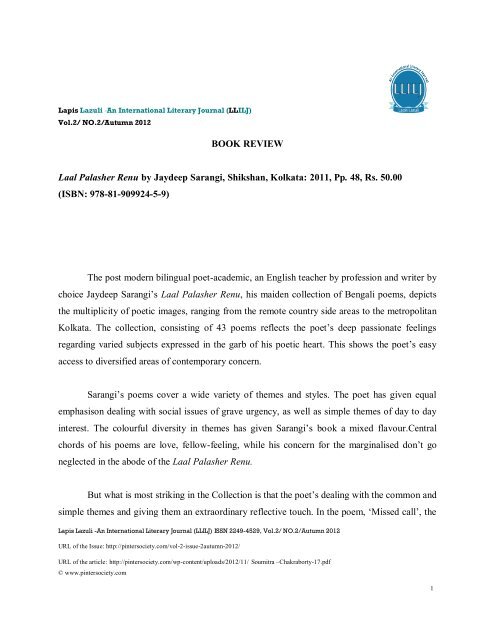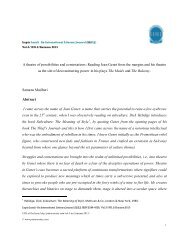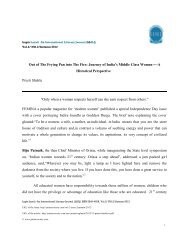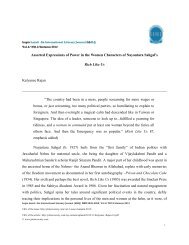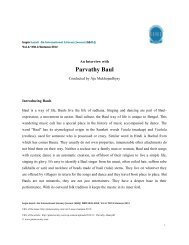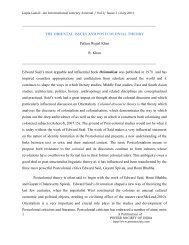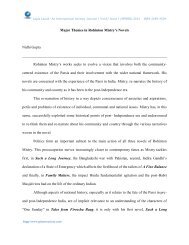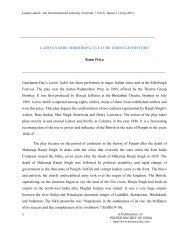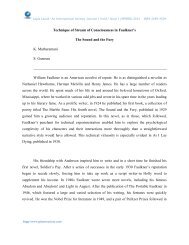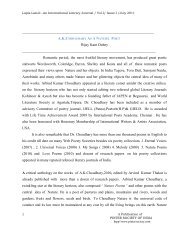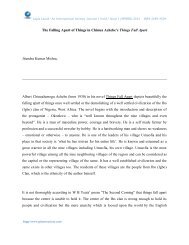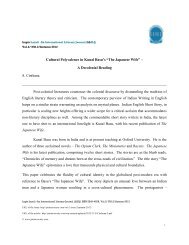Laal Palasher Renu by Jaydeep Sarangi - lapis lazuli
Laal Palasher Renu by Jaydeep Sarangi - lapis lazuli
Laal Palasher Renu by Jaydeep Sarangi - lapis lazuli
Create successful ePaper yourself
Turn your PDF publications into a flip-book with our unique Google optimized e-Paper software.
Lapis Lazuli -An International Literary Journal (LLILJ)<br />
Vol.2/ NO.2/Autumn 2012<br />
Lapis Lazuli -An International Literary Journal (LLILJ) ISSN 2249-4529, Vol.2/ NO.2/Autumn 2012<br />
URL of the Issue: http://pintersociety.com/vol-2-issue-2autumn-2012/<br />
URL of the article: http://pintersociety.com/wp-content/uploads/2012/11/ Soumitra –Chakraborty-17.pdf<br />
© www.pintersociety.com<br />
BOOK REVIEW<br />
<strong>Laal</strong> <strong>Palasher</strong> <strong>Renu</strong> <strong>by</strong> <strong>Jaydeep</strong> <strong>Sarangi</strong>, Shikshan, Kolkata: 2011, Pp. 48, Rs. 50.00<br />
(ISBN: 978-81-909924-5-9)<br />
The post modern bilingual poet-academic, an English teacher <strong>by</strong> profession and writer <strong>by</strong><br />
choice <strong>Jaydeep</strong> <strong>Sarangi</strong>’s <strong>Laal</strong> <strong>Palasher</strong> <strong>Renu</strong>, his maiden collection of Bengali poems, depicts<br />
the multiplicity of poetic images, ranging from the remote country side areas to the metropolitan<br />
Kolkata. The collection, consisting of 43 poems reflects the poet’s deep passionate feelings<br />
regarding varied subjects expressed in the garb of his poetic heart. This shows the poet’s easy<br />
access to diversified areas of contemporary concern.<br />
<strong>Sarangi</strong>’s poems cover a wide variety of themes and styles. The poet has given equal<br />
emphasison dealing with social issues of grave urgency, as well as simple themes of day to day<br />
interest. The colourful diversity in themes has given <strong>Sarangi</strong>’s book a mixed flavour.Central<br />
chords of his poems are love, fellow-feeling, while his concern for the marginalised don’t go<br />
neglected in the abode of the <strong>Laal</strong> <strong>Palasher</strong> <strong>Renu</strong>.<br />
But what is most striking in the Collection is that the poet’s dealing with the common and<br />
simple themes and giving them an extraordinary reflective touch. In the poem, ‘Missed call’, the<br />
1
BOOK REVIEW<br />
poet has started with a very common observation of missing cell phone call in every day’s busy<br />
life, but with the progress of the poem, the outlook of the poet has got changed both in letter and<br />
spirit. The incapability of human beings of keeping commitment in the broader perspectives in<br />
any form gives the poem a different hue. According to the poet,<br />
Some calls are received<br />
Some are missed<br />
In auto rickshaw’s sound or in the tunnel of metro<br />
Could not redial again later<br />
Commitments veil themselves,<br />
In the rush of everyday’s work. (Translation mine)<br />
If concern for the marginalized and aspiration for the qualitative upgradation of their<br />
lives become politics, then surely political elements are there in <strong>Sarangi</strong>’s one of the famous<br />
poems in the Collection, ‘Lal Matir Taan’ (The Attraction of the Red Soil). The revolutionary<br />
attitude of the poet has surfaced in his expression in the beginning of the poem:<br />
Have wishes, suddenly break<br />
The years’ long untouched can of mind. (Translation mine)<br />
At the same time his realistic detailing of the saga of the people of the land of ‘Red Soil’ has<br />
been very touchy and original. In the end, the poet’s attempt to relate himself with those persons<br />
despised is prominent. He writes:<br />
Who on the bank of cannel,<br />
Dream, and vacate their hearts<br />
To refill it again.<br />
Loose cotton from mother’s cloth<br />
Reminds me that<br />
I have my family<br />
2
On that land of Red Soil. (Translation mine)<br />
Lapis Lazuli -An International Literary Journal (LLILJ)<br />
Another characteristic feature of <strong>Sarangi</strong>’s poems is their universalism and international<br />
overtones. His powerful imagination has dared to cross the National Boundary and depicted the<br />
realistic pictures of both the countries– ‘Epar Bangla’ and ‘Opar Bangla’ (This Bengal and that<br />
Bengal, more clearly West BengalandBangladesh respectively) in his poem, ‘Shantir Payra<br />
Urhe’ (There Flies the Pigeon of Peace). Similarly, his approach to universalism is found in the<br />
lines of the poem, ‘Baulder Katha’(The Words of the Bauls) –<br />
Baul says–<br />
“O’ heart awake<br />
Accept all”<br />
Dr. <strong>Sarangi</strong> is from a district, which has heralded a strong folk cultural tradition, the<br />
patch of which is evident there in his creations. The traditional Bengali folk elements like ‘Baul<br />
music’, ‘Tribal culture’ etc. dominate his poems. Not only the folk cultural tradition of the<br />
western frontier Bengal, but his poems have upholded the metropolitan middle class Bengali<br />
culture of gossiping and chatting, regarding contemporary political activities and trends. His<br />
poem, ‘Slum is Only Slum’ offers these lines:<br />
Change or reversion?<br />
Fascination or Love?<br />
In crowded bus,<br />
In metro-tunnel,<br />
People are mad in discussion.<br />
The poet’s forefathers settled in West Midnapore near the bank of the sweet silent river:<br />
Dulong and some of the poems of the volume are about that scenic river flowing through tribal<br />
villages. <strong>Jaydeep</strong> <strong>Sarangi</strong> uses the emotions of his poems to convey not only his own memories,<br />
but also to depict the lives of others. Some of <strong>Sarangi</strong>’s poems attempt to provide a much<br />
deserved platform to a rich symphony of egalitarianism. <strong>Sarangi</strong> is a socially committed poet.<br />
3
BOOK REVIEW<br />
<strong>Sarangi</strong>’s poems are known for the lucidity of expression and profundity of thought. His poems<br />
are written in such a language, in which common people speak. He doesn’t create linguistic<br />
distance and remains rooted in his soil. Ideas are expressed explicitly, which strike the thought<br />
process of the readers. He is an established name in the realm of English poetry and Indian<br />
English criticism. His first volume of Bengali poems, <strong>Laal</strong> <strong>Palasher</strong> <strong>Renu</strong> has really marked a<br />
good beginning of his long potential journey as a bilingual poet.<br />
Soumitra Chakraborty<br />
Mallabhum Institute of Technology ,West Bengal, India<br />
4


